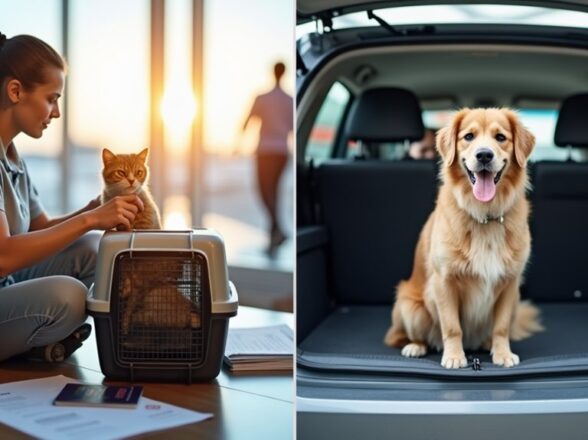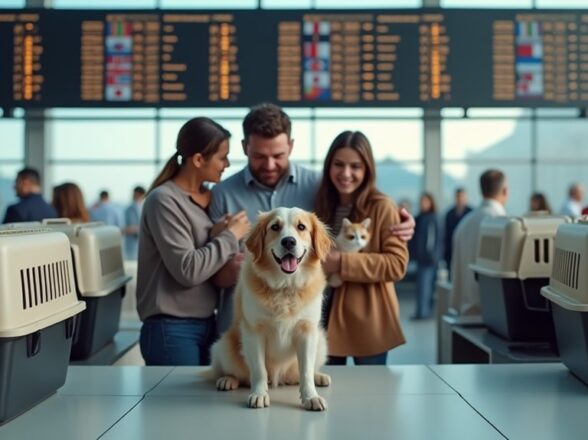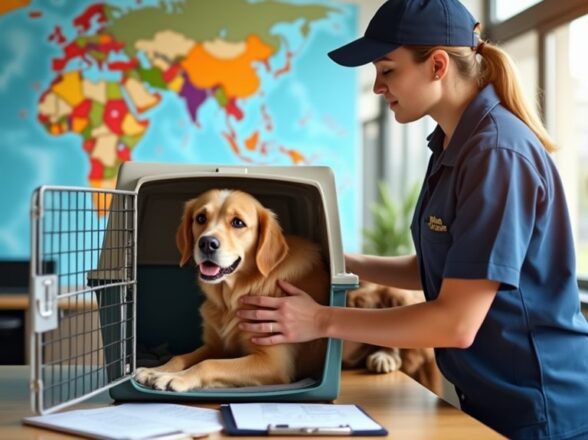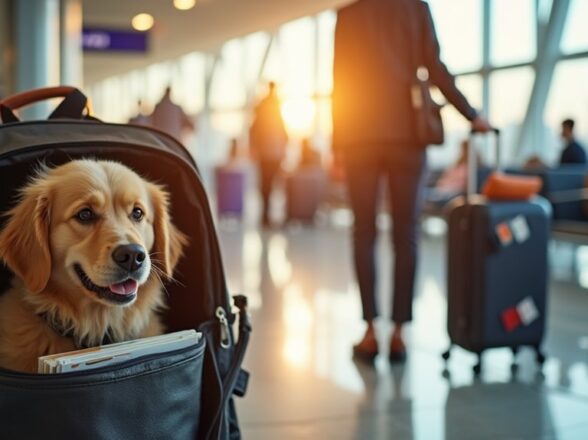How to Move Pets on a Budget Without Compromising Safety? Cost-Saving Tips for Affordable Pet Relocation

To move your pets on a budget without sacrificing safety, start by budgeting all related costs. This includes transportation, crates, and necessary travel documents. Look for affordable transportation options and consider renting or purchasing used crates. Always choose an airline-approved crate. Familiarize your pet with the crate before travel to reduce stress. Plan meals and hydration during the journey and take regular breaks. Research local regulations at your destination to avoid unexpected fees. Engage community resources for tips on pet comfort and well-being during the move, as they can offer valuable insights for a smooth shift ahead.
Understanding Pet Relocation Costs

When you're planning to relocate your pet, understanding the costs involved is essential to avoid any surprises down the line. Pet relocation costs can range from $2,000 to $4,000, influenced by various factors affecting the process. For instance, destination, pet size, and required services play significant roles. Pre-travel vet checks and health certificates usually cost between $100 and $300, while vaccinations and microchipping can add another $50 to $200. Additionally, airline fees vary from $200 to $1,200, based on the airline and distance. If you opt for a professional pet relocation service, expect to pay between $1,000 and $4,000. Always compare quotes to find the best pricing for your needs and budget.
Key Components of Expenses
When moving your pet, you'll need to contemplate several key expenses. Essential travel documentation, veterinary services, and transportation costs all add up quickly. Understanding these components helps you budget effectively for your pet's relocation. Many pet moving services offer comprehensive insurance options to ensure your pet's safety and provide peace of mind during the relocation process.
Essential Travel Documentation Costs
As you prepare to move your pet, understanding the essential travel documentation costs can help you budget effectively and avoid surprises. Pre-travel vet checks and health certificates typically range from $100 to $300, ensuring your pet meets the import requirements. Vaccinations and microchipping usually cost between $50 and $200, which are important for health and identification. Import permits may add another $50 to $300, depending on your destination's regulations. Don't forget about essential travel accessories, costing between $20 to $100, for your pet's comfort. Finally, budgeting for potential quarantine fees is critical, as these can range from $500 to $1,500. By planning ahead, you can save money while ensuring safe pet travel.
Veterinary Services and Vaccinations
Understanding the costs associated with veterinary services and vaccinations is essential for budgeting your pet's move. Pre-travel vet checks and Health Certificates typically cost between $100 and $300. Required vaccinations and microchipping range from $50 to $200. To save on vet visits, schedule one appointment for all necessary services. Here's a helpful breakdown of potential costs:
| Service | Estimated Cost |
|---|---|
| Vet Check & Health Certificate | $100 – $300 |
| Required Vaccinations | $50 – $200 |
| Microchipping | $50 – $100 |
| Package Deals | Varies |
| Total Estimated Cost | $200 – $600+ |
Research and prepare a checklist for these required vaccinations to avoid last-minute expenses. Inquire about package deals to maximize your savings.
Transportation and Crate Expenses
While planning your pet's move, it's crucial to factor in transportation and crate expenses, which can greatly impact your budget. The costs associated with transporting your pet can range from $200 to $1,200 based on the airline, pet size, and destination. You should compare multiple airlines to find the best rates. Pet crates also vary considerably in price, costing between $70 and $500. Confirm the crate meets airline specifications for safety and comfort. Renting or purchasing used crates can save you money. If you opt for pet transport services, be prepared for costs from $1,000 to $4,000. Booking transportation in advance helps reduce costs, especially during peak travel seasons. Plan early to save considerably on pet travel fees.
Additional Costs to Consider

When you're planning to move your pet, it's important to take into account additional costs that can quickly add up. Quarantine fees, which range from $500 to $1,500, may be required depending on the destination's regulations. You'll also need to budget for import permits, which can cost between $50 and $300 to guarantee compliance with local pet travel laws.
Quarantine Fees Overview
Quarantine fees can be a significant expense to factor into your pet relocation budget, especially since they vary widely based on the destination country and the required duration. Countries require these fees to control diseases and guarantee pet health. Understanding these costs can help you plan better.
| Country | Quarantine Fee Range | Duration (Days) |
|---|---|---|
| Australia | $500 – $1,500 | 10 – 30 |
| New Zealand | $600 – $1,200 | 10 – 30 |
| Singapore | $500 – $1,000 | 10 – 30 |
| Japan | $300 – $1,000 | 7 – 30 |
| United Kingdom | $400 – $1,500 | 21 – 120 |
Consult with pet relocation services to get accurate information on quarantine requirements and associated fees.
Import Permits Expenses
Import permits are an essential expense in the pet relocation process, typically costing between $50 and $300 depending on your destination's regulations. As a pet owner, it's vital to budget for these import permits early to avoid unexpected costs. Here are some important factors to take into account:
- Research Requirements: Different countries have specific import permit requirements, so be sure to check these in advance.
- Processing Times: Some permits might take longer to process, causing delays if not planned for.
- Assistance Options: Some airlines or pet relocation services can help with the application process, making it easier for you.
Failing to obtain the necessary import permits can lead to additional quarantine fees, which can cost between $500 and $1,500.
Budget-Friendly Transportation Options
Finding budget-friendly transportation options for your pet can be a challenge, but it's definitely doable with some planning. Driving your dog yourself is often the cheapest choice, allowing you to control the journey and take breaks. If you prefer not to drive, consider specialized pet transport services. They often provide competitive rates and use climate-controlled vehicles for comfort. For air travel, flying smaller dogs as checked baggage can save you money, as the costs depend on weight and size. Alternatively, larger dogs can fly as cargo, which may be cheaper than ground transport for long distances. Booking in advance is essential. It can lead to significant savings on the costs of moving your pet. Utilizing professional equipment such as climate-controlled pet carriers ensures your pet's safety and comfort during relocation.
Accommodation Savings and Planning

How can you save money while ensuring your pet has a comfortable place to stay? Here are some tips for accommodation savings that keep costs low while being pet-friendly:
- Research extensively for pet-friendly accommodations that waive extra fees or offer perks, saving you $20-$100 per night.
- Use platforms like Airbnb to find affordable rentals. Filtering for pet-friendly options can lead to significant savings compared to traditional hotels.
- Consider camping in national parks, where pets are often welcome at little to no cost, making it an economical choice.
Meal Planning on a Budget
When you're on the move with your pet, planning meals on a budget can make a big difference in your overall expenses. Start by bringing your pet's regular food from home. This helps save money and keeps their diet consistent. Pack collapsible bowls for easy feeding on the go. Prepare a cooler filled with meals and snacks for you and your pet to avoid high dining costs. Look for picnic areas at your destination to enjoy affordable meals together. Finally, create a budget that includes travel, lodging, food, and activities for your pets. This approach will help you manage your finances effectively while ensuring your pet is well-fed during the relocation process. Consider exploring cost-saving rental features, such as no commission fees and flexible payment plans, to further ease the financial burden of moving.
Comfort and Safety Tips

To guarantee your pet's comfort and safety during travel, it is crucial to use an airline-approved travel crate that meets safety regulations. This crate should have proper ventilation and enough space for your pet to stand, turn around, and lie down. Here are three tips to make travel less stressful for your furry friend:
- Familiarize your pet with the crate and accessories at home to reduce anxiety.
- Maintain a consistent feeding and hydration schedule, offering water and small meals during breaks.
- Plan frequent stops during long trips for exercise and bathroom needs.
Using calming products like pheromone sprays can also help. By following these tips, you'll guarantee your pet's comfort and safety throughout the journey. Additionally, when relocating to a new destination like Dubai, understanding social norms can ease the transition for both you and your pet, ensuring a smoother settling-in process.
Utilizing Community Resources
While maneuvering the challenges of relocating your pet, tapping into community resources can offer invaluable support and cost-saving solutions. Engaging with local groups can connect you with affordable services and experienced individuals. Here's how to utilize these resources effectively:
| Resource Type | Examples | Benefits |
|---|---|---|
| Social Media Platforms | Facebook groups like PetRelocation | Gather firsthand experiences |
| Local Forums | Nextdoor and community boards | Recommendations from neighbors |
| Pet Events | Local expos and meetups | Network with pet owners |
| Online Communities | Reddit or specialized pet relocation forums | Tips and shared resources |
Frequently Asked Questions
How Can I Save Money on My Pet Expenses?
To save money on pet expenses, consider pet insurance savings, explore DIY pet care options, and invest in budget-friendly supplies. Shopping smart and planning ahead can greatly lower your overall costs while keeping your pet happy.
Can You Move Internationally With a Pet?
Yes, you can move internationally with a pet. Just make certain you understand pet relocation regulations, international travel requirements, and any quarantine procedures overview to guarantee a smooth shift for both you and your furry friend.
How Do You Travel With a Dog on a Budget?
Imagine hitting the open road with your pup, their tail wagging like a flag. For budget-friendly travel, pack your own dog travel gear and find affordable pet carriers to keep costs manageable while ensuring comfort.
How Much Does It Cost to Take a Pet to Another Country?
Taking a pet to another country typically costs between $2,000 to $3,000. Keep in mind pet import fees, international travel regulations, and potential pet quarantine procedures can greatly impact your overall expenses.
Conclusion
In conclusion, moving your pets on a budget is achievable with careful planning and resourcefulness. By understanding the costs involved and exploring affordable transportation options, you can guarantee a safe relocation. Remember to take into account accommodations and meal planning to keep expenses low. With the right approach and community resources, you can navigate this process smoothly. Your pets deserve a safe journey, and with these strategies, you can provide just that without breaking the bank.
Related posts
Recent posts
Post Categories
Tags
Subscribe













